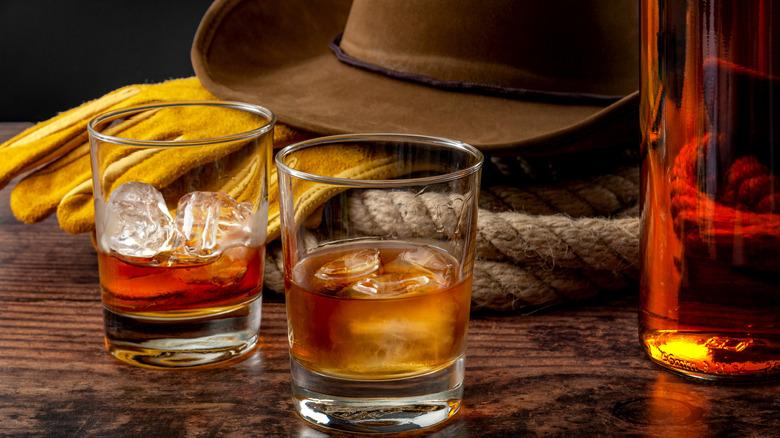Why American Single Malt Is The Whiskey Trend You'll Keep Seeing More Of
You may have seen the news about Frey Ranch Distillery's debut American Single Malt Smoked Whiskey. Single malt whiskey is something of a novelty in the American whiskey scene and we were curious about why the distillery chose that route. To find out more, we talked to Colby Frey, Whiskey Farmer and co-founder of Frey Ranch Distillery.
"Kentucky Bourbon has been the darling of the American Whiskey category for years," Frey told us. "And rightfully so, but distillers are experimenting more than ever and the grains they distill are central to that conversation and what's pushing the category in new and exciting directions. Additionally, the American palate is expanding — and with greater access to more international whiskies — it makes sense that American distillers are looking to capitalize on those trends." One particularly popular international version is Scottish whisky, which is known for using a single malt mash bill.
But it isn't just marketing and hype. The craft whiskey boom is fueling a lot of experimentation with new and higher-quality products. As Frey put it, "I think people are pushing the envelope and experimenting with other types of grain to differentiate themselves in a crowded category. Craft distilleries, in particular, are willing to push the envelope vs. the traditional large distilleries who are more married to their traditional processes... The flavor profiles you can create with malted grains really opens up a world of options — and gets consumers excited."
How will American single malt be different?
Although we can't know for certain what the American take on single malts will look like, we can take some educated guesses. The first thing to keep in mind is that the idea of single malt is closely connected to Scottish whisky. Traditionally, a good portion of scotch was smoked with peat. Peat is a dense layer of organic material that sits in the upper layer of marshes and bogs. It's a nonrenewable resource since it takes thousands of years to build up, meaning it will one day run out. Scotland has plans to eventually end the sale of peat to reduce the environmental impact and cut down on pollution, which will undoubtedly impact how scotch is made. America doesn't have quite the same abundance of peat, but that didn't stop Frey Ranch from smoking their single malt. Frey Ranch MacGyvered an old silo into a DIY smoker and used the organic debris from their farm to make a peat alternative. That's American ingenuity for you.
Another difference that may seem inconsequential but which will have a huge impact on the product is climate. Scotland is cold and humid, while much of the United States is dry and hot (relatively speaking). When scotch is aged in the barrel, the humidity causes the alcohol to evaporate faster than the water, resulting in a lower-proof whiskey. With Americans' love for high-proof whiskeys, American single malts may evolve to become a high-proof alternative to low-proof scotch.

